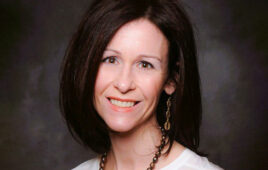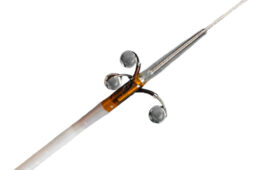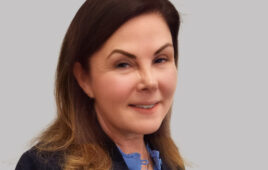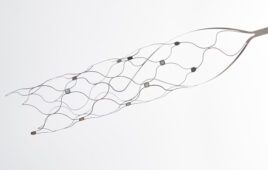
Svetlana Contrada [Photo courtesy of Berry Global]
“I have over 23 years of the industrial experience in PSA tapes R&D. Since 2002, I was actively involved with the Pressure Sensitive Tape Council (PSTC), a trade association for PSA adhesive tape manufacturers and suppliers. I have 27 granted patents and over 120 patent publications. I live in New Jersey with Richard, my husband of 25 years, and our son Edward, 21.”
What first drew you to medtech? When did you first know you wanted to be in the industry?
Contrada: For the first time, I was fascinated with polymeric materials in the ninth grade of high school, when I first learned about polarization of polymer-based dielectric materials. I still have that textbook and refer to it occasionally for inspiration! Early on, my attraction was to the applied research and development of new materials for practical use. I started my career as a polymer scientist in the industrial sector. Over time, I gravitated toward the medical product applications because of the profound positive impact they have on human life. When an opportunity at Berry presented itself, the product line and nature of the products for medical applications is what drew me the most.
What projects, past or present, have made you love what you do?
Contrada: Product development projects that require my expertise from concept to commercialization are my favorite. Creating the product in the lab, and then seeing it materialize in production process, and converted into the part of the medical device for use in actual application, such as in the hospital, provides me with the feeling of satisfaction and desire to create even better constructions. Knowing that the new product is robust enough to withstand the rigorous performance demands gives me the satisfaction of a job well done. In a way, all of my projects are my favorite: new product development, product redesign, modifications and troubleshooting of existing products, or qualification of new raw material. Each product is unique in the specialty tape business! There is always something new to learn from any project and product. I feel enthusiastic about any project task, no matter how mundane and uninteresting it might appear to others. It is exciting just knowing that completing such tasks will bring me a step closer to the final objective: creating a quality product that meets and exceeds customer expectations.
What projects are you most looking forward to?
Contrada: Currently I am working on a new product that requires close collaboration between multi-functional teams at Berry, our medical converting partner and final customer, a medical OEM. The complexity and intricacy of this developmental project is such that I have never seen before in my experience in the medical tape industry. Being a part of the team is exciting and I am looking forward to contributing to this project at the level of the technical expertise it requires. The new project scope is currently under development for the next generation medical device that will require Berry to develop a component responsible for the final product performance. I am looking forward to meeting this new technical challenge!
What are some of the barriers women face in today’s medtech industry, if any?
Contrada: I am not aware of such barriers specific to the medtech industry. As a woman, I can highlight the challenge to maintain the life-work balance. Time and resources constraints to do so could be a barrier to professional accomplishments. We all have our different individual barriers on the way to self-realization and fulfillment, including professionally. I am so happy to see many bright and talented women leaders at Berry. I have the privilege to work with them, and to learn from the best!
Describe your biggest leadership challenge. How did you conquer it or resolve it, or what was the outcome?
Contrada: In the year 2000, after two years with the company as a product developer, I was promoted to a manager position of the R&D department. It was my first time in the management position, and the challenge was to build a strong team. I learned that one employee, who was with the company for over 15 years, was very upset, mostly with my lack of managerial experience. He was oppositional and not willing to communicate. However, this was before the first technical problem occurred, where he could use some help and needed to bounce ideas around. Over the next five years we worked on multiple technical projects and challenges together. Earning his respect and trust in the process was the best outcome I could wish for, and the one I am proud of. His opinion did matter to me a lot! He actually helped to build a stronger R&D team, as a result. After our professional paths took us in different directions, we stayed in touch. Once, he told me that when faced with a technical challenge he often thinks: “What would Svetlana say? What would she do in this situation?” It helps him find the solution. As a leader, I could not dream of better praise.
Talk about your leadership skills. What is the most important lesson you have learned that has guided you in your career?
Contrada: As a leader, I care about people and projects now even more than when I just started my career! I like to cultivate positivity, inspiration and mutual respect. Conflict resolution in a timely manner via open communication is important. The important lesson I learned that guides me in my career is that most people will respond to caring on both professional and personal levels. Your passions will resonate with others allowing us to connect and to become stronger and succeed. As a technical leader, I rely on the technical expertise I accumulated over the years in the industrial sector and my professional network.
In your opinion, what more can be done to promote greater participation of young women in the medtech industry today?
Contrada: It would be helpful to present the younger generation with opportunities to learn about the medtech industry and give them the chance to be inspired. Exposure to real-life role models who can captivate and inspire will promote such participation. Highlighting the life-saving aspects of the medtech products, real-life stories about saving a person’s life with the medical device can foster engagement. There should be more award-winning movies made where women scientists who work in medtech industry save the world, or at least save their colleagues! Think “The Martian,” but related to medtech, not botany powers. I believe inspiration is the key to engagement and greater participation. Of course, it is important to back it up with resources to help them to translate it into action.
Why is it important for companies to be more inclusive and have more women in charge?
Contrada: Women in charge have unique perspectives from the standpoint of experience, expertise and life-work balance. Team environment under such leadership has a chance to be less authoritative, more inclusive, goal vs. ego oriented, and more cooperative. Diversity of leadership can add to the company’s success.




